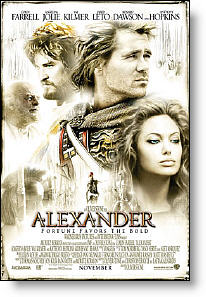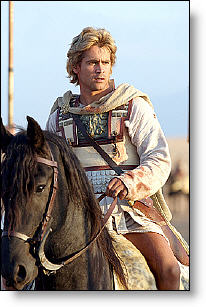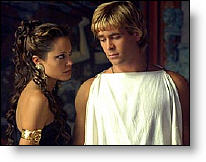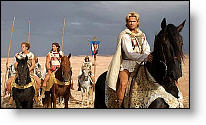Alexander
 for violence and some sexuality/nudity.
for violence and some sexuality/nudity.
Reviewed by: Chris Monroe
STAFF WRITER
| Moral Rating: | Very Offensive |
| Moviemaking Quality: |
|
| Primary Audience: | Adults |
| Genre: | Action Adventure Biography |
| Length: | 2 hr. 55 min. |
| Year of Release: | 2004 |
| USA Release: |
November 24, 2004 |





| Featuring |
|---|
| Colin Farrell, Rosario Dawson, Anthony Hopkins, Angelina Jolie, Val Kilmer |
| Director |
|
Oliver Stone |
| Producer |
| Thomas Schuhly, Oliver Stone, Jon Kilik, Iain Smith |
| Distributor |
“Fortune favors the bold”
Oliver Stone’s “Alexander” isn’t great. Apart from a few captivating moments, the greatest thing about it is its running time. Some scenes resonate with the current war in Iraq, but the strongest emphasis is the diversity of love relationships that Alexander has with others. Most of all, I didn’t feel engaged in the movie, and found it very difficult to sympathize with any of the characters.
Beginning and ending with Alexander’s death, this story has another set of bookends with the character Ptolemy (Anthony Hopkins), who also provides narration throughout the story. Starting as a young boy, we see Alexander (Connor Paolo) growing up and being taught by his teachers as well as his mother, Olympias (Angelina Jolie). After Alexander (Colin Farrell) grows up, his “father” Philip (Val Kilmer) dies, and Alexander takes over the kingdom. He leads the people to conquer other kingdoms, until he is finally stopped in India. The story includes many historical facts and details, while also emphasizing some specific interpersonal relationships of Alexander’s.
One poignant relationship is with his male friend, Hephaestion (Jared Leto). The night before battle, Alexander is looking nervous when his friend Hephaestion asks him, “Is there no love in your life?” Alexander begins opening up to him and speaks very intimately—confessing that it is only him that he loves. There is nothing physical that we see happen between them. It is also a relationship that causes Alexander’s wife, Roxanne (Rosario Dawson) to be jealous, and ask, “Do you love him?” to which Alexander replies, “There are many different ways to love.”
The R-rating is due to battle related violence, sex and nudity. I did not notice any foul language. After Alexander is confronted by his wife, he begins to force himself on her and strips her clothes off. (This scene is reminiscent of a prior scene where Philip forces himself on Olympias until he is stopped.) During their scuffle, Alexander is impressed by how Roxanne is fighting back and compliments her for her lack of fear. He is impressed by her and says that he will die for this kind of love. Consequently, he tells her that his life is hers and declares that she will have his son. A somewhat explicit sex scene follows.
The idea of homosexuality is referenced or implied several times throughout this story. Besides hints in his relationship with Hephaestion, it is also implied that Alexander is sleeping with his man-servant, who is disappointed when Alexander tells him he will be bathing alone one night. Later, we see Alexander subtly inviting him to bed. On another night, at a party, the people watch a show of male dancers, coupled together with hints of homoeroticism. When coaxed by the crowd after the performance, Alexander gives in and kisses one of the male dancers—followed by a cringe from his wife.
Another possible element of the director’s visions for this film is the relevance to the current war in Iraq. There are moments that can be inferred to relate to President Bush leading our country into war. After having conquered so much, Alexander wants to continue and conquer more, but the people are not with him. They say, “We’ve seen too many people die,” and exclaim how they want to see their families again. Alexander tries to keep it positive and promises them pensions, and boasts of how he took them farther than his father did. However, the film seemed neutral on the subject, not trying to take sides on this issue, and any reference to current events is subjective.
Having been entertained by previous Olive Stone films, it was surprisingly difficult to find much entertaining here. The greatest sequence is the battle in India—involving very stylized elements. This reviewer wishes that Stone would have incorporated more of this approach to the entire film, rather than only at the end. The straightforward narrative aspects made it a bit dry. The fact that it was extremely difficult to sympathize with the characters made it all the more disengaging. It might have been much more enjoyable if Stone has used the strength he has with poetic images and done the entire film in that way.


[Extremely Offensive/1½]
[Very Offensive/2]
Stone presents Alexander’s character as overtly feminine and greatly attracted to all the feminine looking male supporting cast around him. For such a blatant homosexual message, Stone presents the stereotype of homosexuality, a domineering mother who controls and caresses, in her bed, a young Alexander to the point of nausea, not counting her fixation with snakes, and a distant father who does not show any love. Throughout the movie Alexander is in search of his father’s approval and a father figure, finding relief in his male lovers.
There are seveal full mouth kisses from Alexander with other men. There were some good battle scenes and Alexander shows some good leadership qualities and principles. Any good quality this movie has was overshadowed by the continued return to Alexander’s feminine side and one useless sex scene, actually with a woman, that went way to long to prove any point other than simple sensationalism. My neck hurt from looking away and talking to another patron during this scene. The movie was a great waste of time and left one thinking, what a missed opportunity for a good movie. Committed Christians should avoid this movie at all costs.
[Very Offensive/4]
[Extremely Offensive/1½]
[Extremely Offensive/1]
[Extremely Offensive/1]
Don’t see the nasty film. I can’t believe it made it to the big screen… but then again, as we become more and more like Sodom and Gomorrah in America, I guess I CAN believe it.
[Extremely Offensive/1]
[Extremely Offensive/3]
[Very Offensive/___]
[Extremely Offensive/1]
[Extremely Offensive/2]
I didn’t know Alexander was a homo, but even if he was… I think the movie would be better if it wasn’t shown. It was nonsense! I don’t know what’s the reason or purpose of the scriptwriter why it was included in the film. But whatever it is, it’s really annoying.
To those who are still planning on seeing this movie, better turn your interest on something else.
[Very Offensive/1½]
[Extremely Offensive/2]
[Extremely Offensive/1]
[Very Offensive/2]
As far as moviemaking goes, the film is fabulous. The scenes, the background, and the costumes are absolutely breathtaking. Colin Ferrell IS Alexander and I can see him getting a Best Actor nomination for the Academy Awards. This film is a lot better than Troy (and probably more historically accurate, too), despite the fact that Brad Pitt and Colin Ferrell are equally attractive. Another complaint is that this film runs for 3 hours but it runs rather quickly.
I do have a problem with Angelina Jolie playing Alexander’s mother. She is far too young (she and Colin Ferrell are about a year apart in age) and an aged actress around 50-60ish should’ve been playing the part. What surprised me is seeing Val Kilmer playing the part of one-eyed Philip of Macedonia (both Val Kilmer and Angelina Jolie playing Alexander’s parents left me scratching my head). Viewers should take note that Alexander IS NOT Greek, but Macedonian.
Another note: the film is incredibly violent and I nearly lost my breakfast after watching the first major battle scene. I loved the movie except for the offensive stuff. Being a history major, I can say it’s fairly accurate. My professor in Greek history also agrees it’s accurate (and that’s saying something… historians are a tough crowd). For those interested in learning about Alexander, there is a historian by the name of Eugene Borza who is a scholar on Alexander. I’m sure his books are available in bookstores or in a local library.
The film takes place about 50-60 years after the last of the Pelopennesian Wars and about 150 years after the Greece vs. Persia conflict. Alexander has conquered most of the ancient world at an age when people would normally be stuck working in a boring cubicle job. He is pretty much the Napoleon Bonaparte of the ancient world with a string of military victories only to be defeated in India (likewise, Napoleon had his share of conquest only to be defeated in Russia and at Waterloo). This film is not appropriate for teen-agers under 18.
When the film comes out on DVD/Video, I strongly urge Christians to order it through a company that filters movies for objectionable content because it is really too good to miss.
[Extremely Offensive/5]
[Average/3]
[ Better than Average/5]
[Good/4]
All I’m saying, people, is think about the subject of the film you’re going to see. Also look at the ratings, don’t bring a child to this movie and then act shocked when they see the sexy bits. I mean, really. God gave you common sense, use it.
[Average/4]
Alexander does NOT have to be interpreted as a homosexual in this film, even though the movie does show that homosexuality was present in Greek society (which is historically accurate). The film clearly portrays that Alexander tries to keep control over his passions…
…The movie never shows Alexander during a homosexual act, and the only time he is shown having sex is on his wedding night. What makes the movie great is the focus on Alexander’s pursuit of his vision to create a lasting empire in the world that unified all peoples. The overall message of the movie is that greatness is achieved through the complete pursuit of a vision and requires control over passions and other desires.
[Better than Average/5]
[Very Offensive/2½]
[Extremely Offensive/1]
Pros: There is ONE, but not enough to save this film. The fight scene in the Jungle near the end of the film was done amazingly, and is the best directed scene since “Saving Priavte Ryan”’s D-Day opening. But, by the time it’s done, you hopes fall apart as the film does absolutely nothing to make you enjoy it.
[Very Offensive/1]
[Extremely Offensive/1]
The story itself is interesting, and I didn’t mind the slow pace. The dialogue was carefully chosen for the film, the acting was really quite good from Colin Farrell as well as other characters—including the almost unrecognizable Val Kilmer.
It wasn’t the story that brought out the negative side of the film, but the sexual content. The movie had moments of extreme stylized violence, but that is expected in a movie about war. The sex scene between Alexander and Roxanne was graphic, but from I’d heard from the movie, it was the only sex scene. Not so, the man servant Alexander falls in love with—or at least lusts after—is shown in Alexander’s bed. Alexander crawls in with him—showing a brief moment of frontal male nudity—and they begin to kiss and grope. Now I do realize I watched the “Final Cut” version of the film, so footage was different. Obviously I made a mistake.
I am a movie nerd so I usually insist on watching the “Final, Director’s or Uncut” versions of movies—“Alexander” being 3½ hours long. Though the added story was good—the other footage was not. I fast-forwarded through the sex scene, but I still feel ashamed for even glimpsing at it. That is how the film “Alexander” made me feel, ashamed.
The film has good qualities, but they are drowned out by the extreme sexual situations—some of which I have mentioned already, but also including attempted rape, male erotic dancing and other disturbing dialogue.
If you must watch this movie, I guess stick with the theatrical release, you will at least escape the most perverted, evil trash the “Final Cut” adds. I don’t know about the “Director’s Cut,” but I doubt it is much better.
Moral rating: Extremely Offensive / Moviemaking quality: 2½
Moral rating: Extremely Offensive / Moviemaking quality: 3

My Ratings: [Extremely Offensive/2]